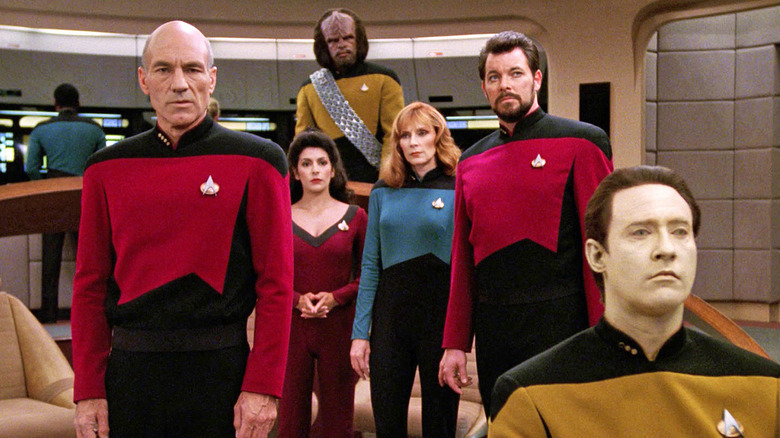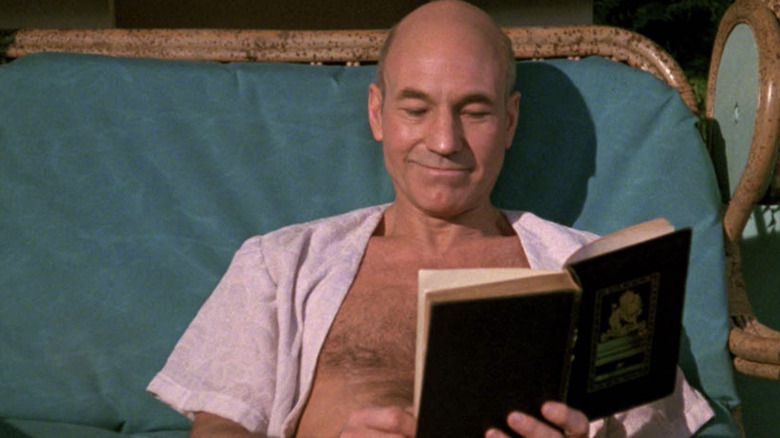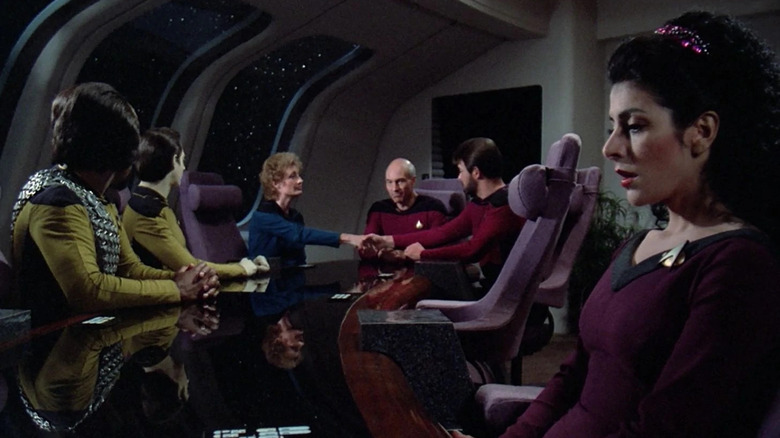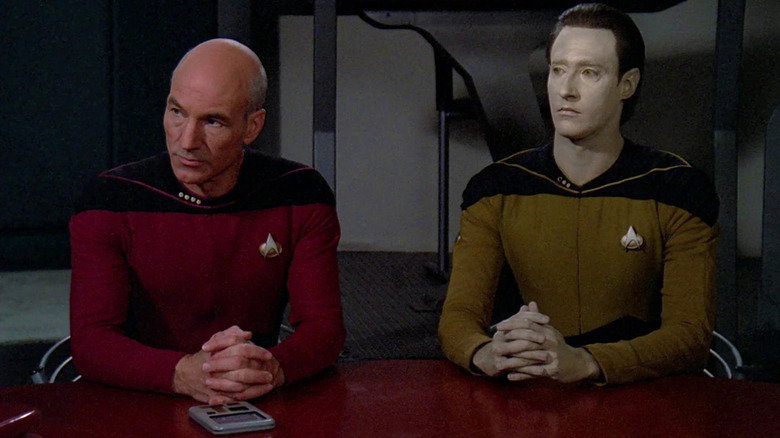A Writers Strike Came Closer To Canceling Star Trek: The Next Generation Than Anyone Knows
It's well known that "Star Trek: The Next Generation" didn't have the easiest beginning. Virtually no Trekkies list season 1 as their favorite of "TNG." As season 1 aired in the Fall of 1988, the series hit another speed bump: The 1988 Writers Guild of America strike. Production on new TV seasons had to be put on hold as negotiations broke down and writers took to the picket line for increased residuals and creative rights.
This WGA Strike lasted for 154 days from March 7 to August 7, 1988, and remains the longest in the Guild's history, barely eclipsing the recently concluded strike of 2023. To cross-reference, "Next Generation" season 1 would finish its run that May. Instead of running away with the momentum of that first season, it was left up in the air. Had the strike gone on for longer, the series could've died on the vine. Captain Picard himself, Sir Patrick Stewart, revealed in his new memoir, "Making It So," that by August 1988, cancellation seemed more likely than renewal.
A SoCal dream
It's important to remember that Patrick Stewart was not much of a Hollywood actor at the time. He'd been in a few movies, yes, including John Boorman's "Excalibur" and David Lynch's "Dune." However, Stewart came up on stage in his native England (he was a staple of the Royal Shakespeare Company for many years). He must've felt like a fish out of water moving to Los Angeles to shoot "Star Trek." He kept in touch with his relatives back home, but when they asked when they could visit him in L.A., he warned them he might not be in Tinseltown for much longer.
"TNG" was already popular; Stewart vividly remembers his first convention and in "Making It So," he recalls meeting a US Navy Officer whose crew watched the show "religiously" while they were at sea. However, the production pause was sapping "TNG" of the energy it needed to warp into season 2. Stewart writes:
"We were still in limbo. And not just in my perpetually worried mind. Ours was an expensive show to produce, and the longer the strike went on, the more momentum we lost, and the more likely it became that Paramount would cut its losses and make 'TNG' a one-and-done show."
Stewart continues that the show was "closer to being canceled than most people realize." During the last days of the strike, Paramount invited Stewart and his then-wife Sheila out to Cannes, France (for a TV convention, not the famous film festival). While there, some Paramount executives whispered to Stewart that "TNG" being canceled was "all but certain."
Stewart notes that he was not "unduly disappointed" with this seeming confirmation. "In the weeks since I had returned to England, I had resumed many of my old routines, and it had all been a bit of a dream, those days in Southern California," he writes.
Starting off season 2
Of course, before Stewart could get too reacquainted with his old trappings, the strike ended. Soon, he and his co-stars were all back in L.A. shooting season 2 of "TNG," where they'd stay for five more years. At first, though, they were in for yet another bumpy ride. Since the writers had to get season 2 rolling quickly (it would premiere in November 1988, three months after the strike ended), many early episodes wound up unrefined. Season 2 only has 22 episodes, not 26 like the previous season or the five more that followed, and the finale "Shades of Grey" is a clip show.
Several of the "TNG" crew spoke about these difficulties when interviewed for the "Star Trek" oral history book "The Fifty-Year Mission: The Next 25 Years" by authors Edward Gross and Mark A. Altman. Executive Producer Rick Berman said, "We didn't have the time we needed. The quality of the first several episodes suffered in that we did not have the time that we would have liked to develop and polish the early scripts." The late Maurice Hurley, another producer/writer, added: "We had a ship dead in the water and we had to try and get it up again, and it was like restoking the furnace. The second season didn't jump off to the right level the way it should have."
The strike did help the show in other ways. Jonathan Frakes (Commander Will Riker) hadn't shaved during the break and returned to the series with a beard. Series creator Gene Roddenberry liked the look so Riker inherited Frakes' beard, making him look much more mature and dignified than in season 1. "Growing the Beard" is now an euphemism for a show improving in quality, which "TNG" did later in season 2.
The endurance of the Next Generation
According to "Star Trek, The Next Generation: The Continuing Mission" by Garfield and Judith Reeves-Stevens, "TNG" started accepting spec scripts during season 2 because the strike left the writers' room with a shortage (spec meaning speculation, or written by an outside writer with the aim of it being sold to the show for production). One of these was "The Measure of a Man," where the android Data's (Brent Spiner) personhood is put on trial. Written by former attorney Melinda M. Snodgrass, the episode was the season's standout.
Flashes of brilliance like "The Measure of a Man" are why "The Next Generation" survived past season 2 and evolved into the classic it is remembered as. Stewart's own role in its survival can't be denied either. In "The Fifty-Year Mission," writer/producer Brannon Braga said:
"So much of the success of "The Next Generation" was Patrick Stewart, quite frankly. We'd always used to say the guy could read a phone book and we'd watch him. He was just so good. I always said a 'Star Trek' series is only as good as its captain, and Picard was pretty f***ing great."
Even when he thought "Star Trek" might be just an extended vacation, Stewart's screen presence elevated the production surrounding him.
"Making It So" is now available in bookstores.



